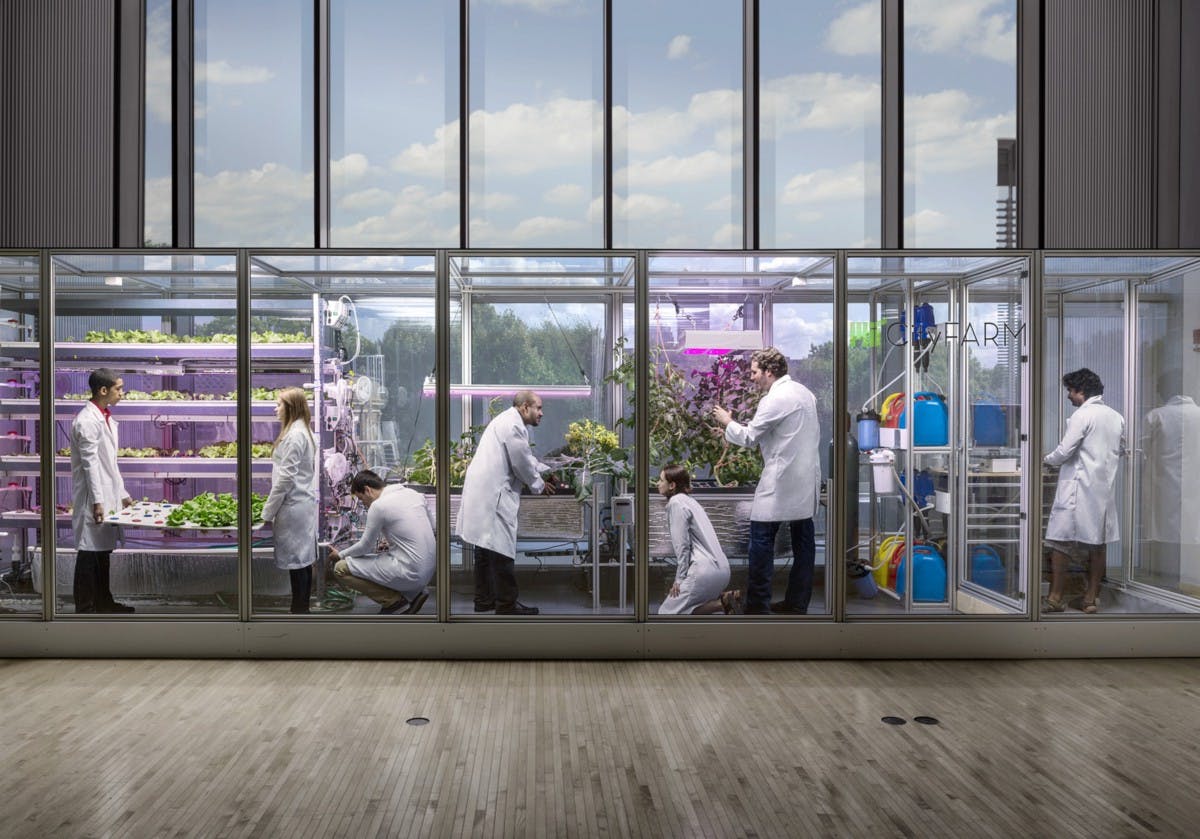The Food Computer
MIT OpenAg Initive’s “Food Computer” uses robotic systems to control and monitor climate, energy, and plant growth inside of a specialized growing chamber. Climate variables such as carbon dioxide, air temperature, humidity, dissolved oxygen, potential hydrogen, electrical conductivity, and root-zone temperature are among the many conditions that can be controlled and monitored within the growing chamber. Operational energy, water, and mineral consumption are monitored (and adjusted) through electrical meters, flow sensors, and controllable chemical dozers throughout the growth period.
I find this incredibly fascinating and inspiring as I genuinely believe this type of innovation can totally transform the way we grow food and innovate around food systems. The technologies of the OpenAg are open source, which enables and promotes transparency, networked experimentation, education, and local production. I especially feel this will lead to an explosion of buried skills and talent in urban agriculture. MIT OpenAg aims at creating sustainable, shared systems that will break down the barrier of entry and spark interest, conversation, and maybe even a revolution about the way we view food.
For me, this is an unprecedented opportunity to take farming to new heights in an engaging and efficient manner. To satisfy the ever-growing food demands of the entire globe, it is inarguable that we must produce better, faster and safer with more ecological and scientific conscience. This system and its likes enable us to do just that, away from some of agriculture’s biggest constraints like soil, pests, chemical supplements, land issues, water issues, etc.
This is the inspiration for a Future Farming programme I proposed to an innovation school in Kaduna State, which aims to bring advances in farming methodologies, advanced genetics and IT sensing to the Nigerian market starting with its own version of the food computer.
In the case of the Food Computer, Individuals, schools and organisations that are interested in learning and teaching about food production can opt for the small-scale environments which are great for experimentation and for learning about biology, botany, environment, programming, engineering, and more or food servers and food data centres which are relatively bigger and more cost-intensive.
Indeed, I feel a great sense of responsibility to use my skills and network of people in advancing agriculture as well as enticing young people into agriculture. Especially with all the proliferation of new technology in Africa like mobile phones, systems like these will be easy to popularise. The great advantage here, of course, is the various scientific disciplines such as climatology, agronomy, soil sciences, big data and software development amongst many others which users of platforms like the food computer will become conversant with if they are to use the systems. Therefore, this will provide an avenue to train young people, especially students in these disciplines by bringing them up, close and personal with the science without the boredom or hardship associated.
Food Fraud
Food Fraud, like all types of fraud, can take many shapes and forms. In Nigeria for instance, the government has operated a farm input subsidy scheme for decades which involved the provision of quality planting materials and agrochemicals at a subsidised rate for the farming populace. However, this scheme is riddled with fraud and corruption which leads to only a fragment of the subsidised farm input reaching its intended target at the subsidised cost.
This results in the underproduction of the entire agricultural sector in the country, seeing Nigeria import $5 billion of food in one year. Tools like the E-wallet, a mobile solution utilised by the federal government were designed to mitigate this, verifying farmer’s access to the subsidised farm inputs and thereby nominally cutting the fraud involved. I saw a big opportunity for disruption with a mobile solution that will not only make farm input more accessible but also agricultural markets, financing and knowledge bases. For years, middlemen exploit farmers and buyers alike with near fraudulent pricing. Farmers are isolated from the formal agricultural markets, including banks, without money or a voice that the market can hear. I genuinely believe that a simple, pervasive mobile communication platform can be harnessed to democratise agricultural data and enhance decision making, facilitate linkages and block all fraud in the system.
I totally interpret ripping off smallholder farmers and blocking their access to market and agricultural knowledge as a fraud in any part of the globe. I find it immensely interesting and thrilling to innovate a solution to the problem among many other African entrepreneurs working on same. The market for mobile agricultural solutions in Africa is booming due to the immense proliferation of mobile devices in the continent. From Cellulant’s E-wallet in Nigeria and Esoko in Ghana to Mfarms and Kilimo Salama in East Africa, there is a cocktail of mobile apps and services both private and backed by governments. Just how these systems solve food fraud, however, is totally dependent on the intricacies that are beyond their binary realm. This is why our policymakers must rise up to embrace transparency and integrity, especially in the agricultural sector to address food fraud.

 Join Daily Trust WhatsApp Community For Quick Access To News and Happenings Around You.
Join Daily Trust WhatsApp Community For Quick Access To News and Happenings Around You.

